|
This section contains 169 words (approx. 1 page at 300 words per page) |

|
Although Comte did not believe in God, he promoted the creation of a "religion of humanity," whose adherents would worship the sacredness of humanity itself. At the heart of this secular religion was a belief in the oneness of the human race. Influenced by his Roman Catholic upbringing, Comte also proposed that the religion of humanity should have a calendar of secular saints' days, a catechism, and a priesthood of scientists, with Comte himself serving as pontiff. Comte's church never emerged as a major institution; yet, the central ideas of Positivism—including the premises that nature is orderly and knowable; all natural phenomena have natural causes; nothing is self-evident; all knowledge should be derived from experience; and the methods of science can be applied to the study of societies—influenced the development of several disciplines, including history, sociology, and...
|
This section contains 169 words (approx. 1 page at 300 words per page) |

|




